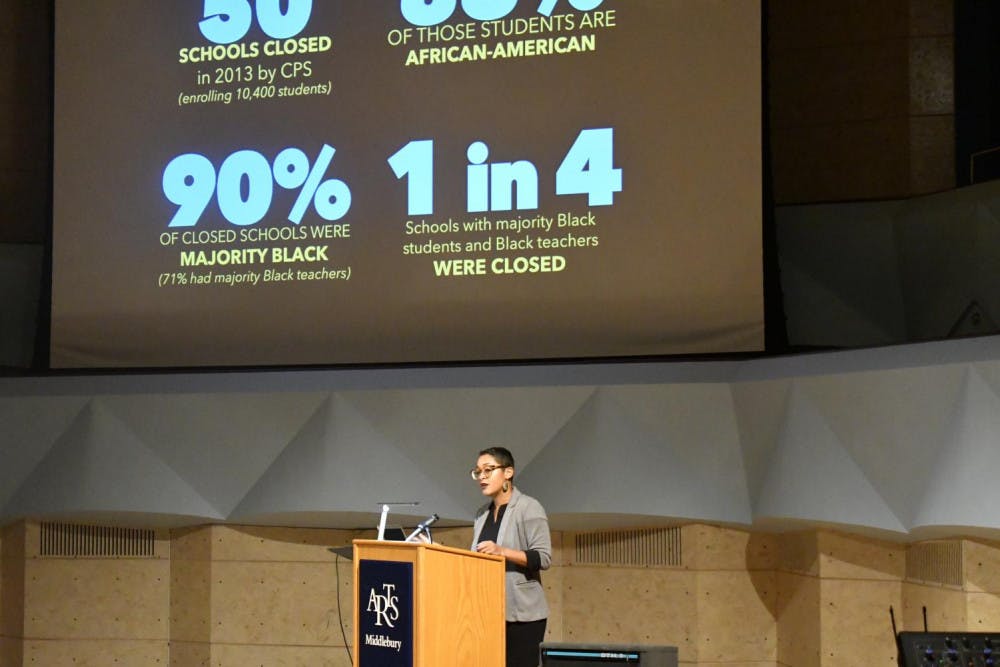Over a hundred students from liberal arts colleges gathered this past weekend at the college for the fourth annual Creating Connections Consortium (C3) summit aimed at diversifying higher education. Twenty-two of the students that attended were from Middlebury and 98 came from other undergraduate schools for this year’s event: “Reimagining the Academy: Constructing Inclusive and Participatory Communities in Challenging Times.” Fifteen faculty and staff members from the college also attended and participated along with 31 graduate students from the C3’s partner research universities.
The consortium aims to provide students with greater opportunities to participate in higher education. By engaging undergraduate students, graduate students, postdoctoral fellows, faculty, staff and administrators with diverse backgrounds in discussions around inclusion and equity, C3 aims to provide students with opportunities to learn, strategize and create lasting connections and information sharing networks with one another.
The weekend included a number of panels and speakers, and presentations from several students, including Nia Robinson ’19, Lulu Zhou ’19 and Marcelo Marcelo López ’19.
Professor of Political Science Jessica Teets and Chief Diversity Officer Miguel Fernández were members of the planning committee.
“Students are creating networks of faculty, other students, and administrators that are so vital for future success,” Teets said. “This is the primary disadvantage faced by low-income, minority, rural, and first-generation students, the lack of professional networks.”
López said that the Summit gave participants the opportunity to envision graduate school as an attainable possibility, and that students felt much more confident about pursuing higher education by the conclusion of the weekend.
Beyond giving students the opportunity to look forward, the summit also provided them the opportunity to reflect on resources the college provides underrepresented students.
“Yes, colleges are admitting more underrepresented students, but how are these students doing when they actually enroll? What can colleges do better to support these students succeed during and after college?” Zhou questioned.
Teets and López echoed that it is time to move past recruitment and to begin thinking deeply about the ways in which the college can truly include and support students from diverse backgrounds.
“There has to be a large focus not just on the recruitment of these individuals, but also the retention of said individuals,” he said.
López said that equity for first-generation students should begin with changes made in the classroom. Professors should recognize that every student walks into the classroom with varying degrees of preparation and different styles of learning.
“My personal opinion is that we need to teach and grade differently to create more equitable learning conditions,” Teets said, arguing that every office and department on campus need to make equity part of their central mission.
The summit also gave students the opportunity to consider how the college compares to other liberal arts colleges represented in terms of their support for students.
Zhou noted that many of the schools are grappling with many of the same issues, including student socioeconomic diversity, financial aid, faculty racial diversity and support programs for first-gen students.
However, she did find that many of the schools represented had created support programs for first-generation students earlier than the college. The college’s First@Midd program was started in 2016.
Lopez also cited First@Midd as an important program for first-generation students and one that did not exist when he was a first year.
“Programs like First@Midd make all the difference in supporting first-gen and low-income students,” he said.
He also cited many other ways in which the college is improving how it interacts with first-generation students. Lopez listed work stipend supplements for January term courses such as MiddCORE and the new initiative to fund ski lessons.
“It makes me happy that future students will be able to benefit from these initiatives – things that were not available during my time at Middlebury,” he said.
Overall, Lopez said he saw the Summit as a success. “Many students left Middlebury with a renewed sense of confidence” he said. “I am excited for what the future holds for these individuals.”
Zhou said she hopes that college will in the future do a better job publicizing the event and encouraging higher community participation.
Teets expressed the importance of programs and events in which promote discussion of how to make Middlebury more diverse, inclusive, and equitable.
“This is hard work in which we all need to participate, so the more we can talk about how to do this, the better for our community,” Zhou said.
Colleges Hosts Annual C3 Conference on Diversity in Higher Education

Comments



